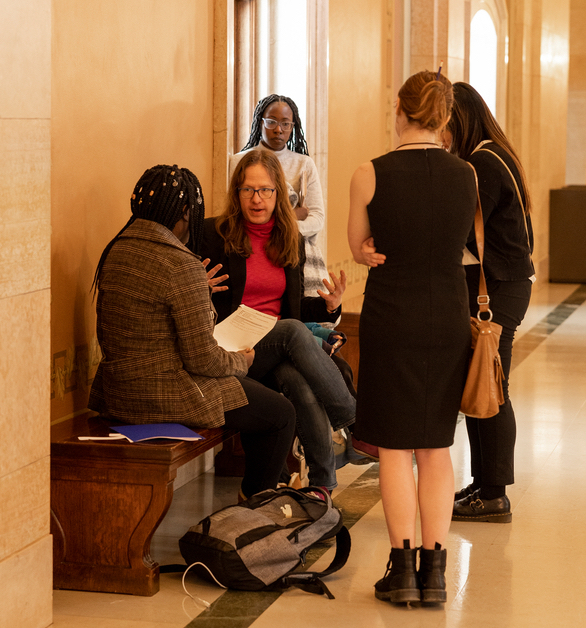
In 2023, 503 anti-trans bills were introduced across the U.S., with 85 of them being passed in Congress, according to the Trans Legislation Tracker. In response to this influx of anti-trans legislation, many states have sought to become sanctuary states for transgender people seeking gender-affirming care, with Minnesota becoming one of them. During the last legislative session, the Minnesota passed a law allowing transgender people to seek gender-affirming care in Minnesota without being penalized or prosecuted in their home state for doing so.
In an age of hate and discontentment towards the transgender community, how do we provide safe spaces for trans people to affirm their identities not only in the Twin Cities but all over the country? In this interview, Kat Rohn, the executive director of community outreach organization OutFront Minnesota, tells ThreeSixty Journalism how her organization answers national outcries from the transgender community for calls for support.
ThreeSixty also interviewed Rep. Leigh Finke about the impact of Minnesota’s new status as a transgender refuge state.
This interview has been edited for length and clarity.
Minnesota has set a trend with being one of the first sanctuary states in the U.S. What have you noticed or observed that other states are doing with this issue?
Last year, OutFront Minnesota, worked on the Trans Refuge Bill, as well as an executive order that was signed by Gov. Tim Walz in March. Both of those helped to protect folks who are coming to the state of Minnesota to seek gender-affirming care, as well as to ensure that providers here in the state can provide care to people coming from other states. We did that in response to more than 20 states around the country that had banned gender-affirming care, particularly for youth; and we knew that there would be an increasing need around that.
Subsequently, there have been a couple of states, like California and Connecticut, that have explored similar laws to the ones that we did that are broadly called shield laws. We’ve seen many other states pursue similar shield or sanctuary legislation to help protect folks in those states so places like Washington, Maine recently attempted to move one forward; New Jersey and a couple of other states have pursued similar legislation.
Research finds that 39% of trans and non-binary youth reported that seeking gender-affirming care has significantly improved their mental health. In your experience as a trans person, do you think that is accurate?
There was some new research data published from the U.S. Trans Survey. This was a survey of over 90,000 trans folks across the U.S. They just published the preliminary data about two weeks ago, and they found that overwhelmingly, the people who sought medical steps to transition, 92% reported an increased overall sense of well-being and self-satisfaction.
That’s true for both youth and adults. Broadly, what we see is that the folks who seek and receive gender-affirming care, have better outcomes for their mental health for overall physical health for their overall well-being and ability to engage in the world. We support it, both because the evidence is there, and personally on an experiential level, being supported and being able to live your life as who you are is a way to live authentically in the world and you’re more able to be fully well-rounded person.
Have you noticed from outsiders that there’s been pushback or disagreement with the inclusivity of this law? If so, how have you dealt with that?
There is not a national consensus right now around trans rights for a lot of people. This is a new area, and so they’re trying to figure out how do I understand this topic? Because media and public discussion can sometimes be positive or negative, people may have different viewpoints on this. Part of our work is to bring visibility to those issues, to help folks to understand it, and then to give them the information and knowledge to understand. What we’re asking for is just basic protections that all Minnesotans are afforded but for a class of people who have been historically underrepresented and have been historically targeted for violence and discrimination.
What do you think Minnesota needs to do to increase inclusivity for trans people?
We know that there’s still more that needs to be done. We know that Minnesotans who are trans already face barriers to accessing health care, and that issues like housing and employment as well as health care tend to be significant issues for LGBTQ+ people at large, but here in Minnesota, certainly for our trans populations. Part of our work this year is thinking about how we can enhance some of those within state policy but also make the case for investments across the board, like for housing and potentially passing the Equal Rights Amendment.
Alexis worked with Katelyn Vue, Sahan Journal reporter and ThreeSixty alum, to finish their story. This story was completed at ThreeSixty’s Winter News Team: Capitol Edition in February 2024, where high school journalists covered important legislative issues, impacting Minnesota youth. Read more stories here.
